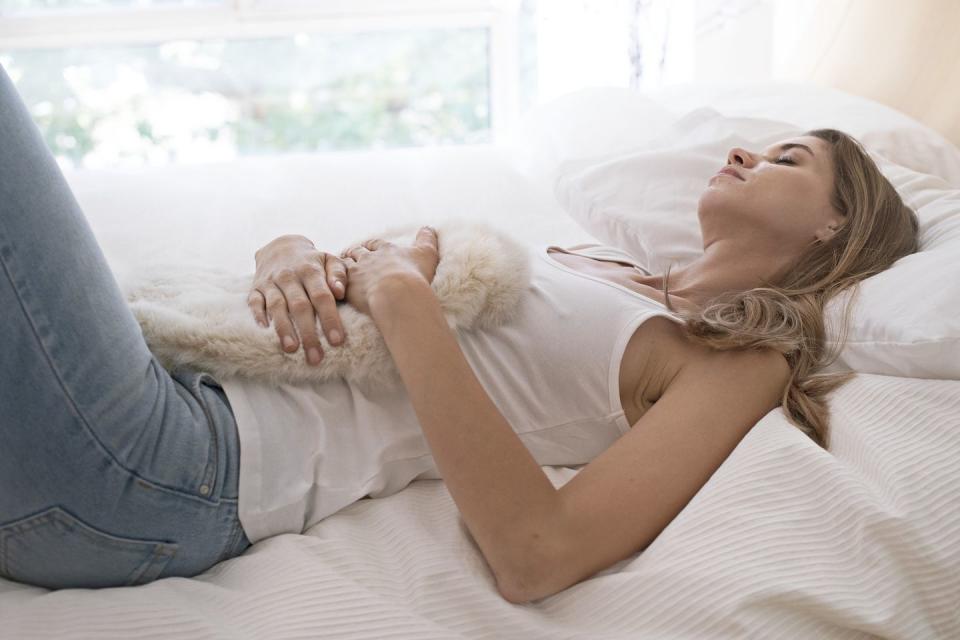All the reasons you could be getting random nipple erections

You know that scene in Sex and the City, where Samantha produces a pair of fake nipples from her bag and Miranda takes them for a spin? And, have you ever just been going about your day, looked down and realised that you look just like Miranda... as she parades around the bar with what appear to be the perkiest nips of all time?
It's happened to all of us, at some point: nipple erections. And sometimes, it's obvious why it's happening (during sex, perhaps, or in your overly air-conditioned office, where the ladies are constantly standing to attention). But there are instances where it feels totally random.
So we've done our research, and asked the experts exactly why this might be happening. Consider this your comprehensive guide to nipple erections (now there's a sentence we bet you never thought you'd read).
What happens when your nipples harden?
A study published in the journal Nature Neuroscience found that erect nipples are controlled by the sympathetic nervous system, which also coordinates and regulates all your other unconscious bodily functions. It's the body's network that controls all stress-related responses (think: goosebumps and your hair standing up on end).
The study's co-author Alessando Furlan explained: "We've shown that the sympathetic system consists of many types of neuron that regulate specific functions in the body.
"For example, one thing we found was that goose bumps and nipple erection are caused by neurons that are specialised to regulate these functions by controlling the erectile muscles in these tissues."
What she's saying is that it's all down to a highly specialised type of nerve cell that does nothing else except generate nipple erections. When these cells are activated, it causes your erector muscles (which are connected to your skin) to contract – causing your nipples to become hard.

What causes nipple erections?
Dr Elise Dallas, a GP specialising in women’s health, at The London General Practice has also weighed in on the cause of nipple erections. Also known as nipple hardening, "it's primarily a physiological response involving a complex interplay of the autonomic nervous system and smooth muscle fibres in the nipple," she explains.
When exposed to various stimuli, such as cold temperatures or sexual arousal, she details that the "autonomic nervous system sends signals to the nipple's smooth muscles to contract."
And this, Rachel Greens everywhere, is what "leads to the nipple becoming erect."
Aside from this, Dr Dallas has further documented a string of the most common causes...
Changes in temperature
Ah, yes. The cold. The same study published in Nature Neuroscience found that cold was one of the most common causes of nipple erections. A drop in temperature will stimulate your sympathetic nervous system – causing not just your hairs to stand on end or goosebumps to form, but your nipples to perk up, too.
"Nipple erections in response to cold temperatures are a well-documented physiological response," Dr Dallas notes. "When the body is exposed to cold, the autonomic nervous system initiates a response to conserve heat. This includes the contraction of smooth muscles in the nipple, causing it to harden. This is the body's way of reducing heat loss through the skin."
Being aroused
For those who aren't in the know, nipples are an erogenous zone – a part of the body with heightened sensitivity, that can bring about sexual pleasure when stimulated. According to Dr Dallas, "Sexual arousal can lead to nipple erections due to the stimulation of the autonomic nervous system. During sexual arousal, there is an increase in blood flow to the genital and breast areas. This heightened blood flow can cause the nipple to become erect, and it's a common response in many individuals." Good to know...

Your menstrual cycle
Anyone who experiences a menstrual cycle will know that your breasts can change throughout the month, be it in size or tenderness. During the ovulation and postmenstrual periods (the latter being the time after your period has finished, as opposed to premenstrual syndrome, a term we're all more familiar with), it's common to experience breast tenderness and swelling – which, in turn, leads to more pronounced nipples.
"Hormonal fluctuations, particularly the rise and fall of oestrogen and progesterone, during the menstrual cycle can influence breast tissue," Dr Dallas says. "Oestrogen causes breast ducts to enlarge, while progesterone promotes the growth of milk-producing glandular tissue."
Dr Dallas adds that these hormonal fluctuations can lead to increased blood flow and swelling in the breast, including the nipple and areola. "This increased blood flow and swelling can contribute to nipple sensitivity, making them more prone to becoming erect."
Pregnancy or breastfeeding
A change in your breasts can be an early sign of pregnancy, according to the NHS. Dr Dallas adds that - during pregnancy - "elevated levels of oestrogen and progesterone prepare the breasts for milk production." She says it's these hormonal shifts that can lead to increased nipple sensitivity and may result in more frequent nipple erections. Plus, as the size of the breast increases (a common side-effect of pregnancy and especially breastfeeding), the NHS explains that the nipple and areola can become darker and more pronounced.
Breastfeeding can also cause your nipples to harden due to added stimulation as you feed, notes Dr Dallas. What's more, a clogged milk duct can lead to mastitis – an infection of the breast tissue that causes the whole area to become hard, and often painful. (If you suspect this could be something you are experiencing, it's best to chat with your midwife or GP.)

Piercings
A nipple piercing can make the area more sensitive, meaning that it is easier to stimulate (and therefore become erect). Depending on the size and shape of the piercing, it can also cause the nipple to appear more pronounced in clothing, too. Dr Dallas explains that the act of piercing the nipple disrupts its normal structure and introduces a foreign body (i.e. the jewellery), and when stimulated - whether it be intentional or unintentional - can "trigger the autonomic nervous system's response, causing the nipple to become erect."
The expert also adds that some individuals may find that the added weight of the jewellery can contribute to this response.
However, one side-effect of a piercing is that it can cause the risk of infection: bacteria can enter through the hole created by the piercing and lead to mastitis (so hard breasts overall – if this has happened to you, please contact your GP).
No actual reason at all
This is where things get a bit confusing. Remember that study published in Nature Neuroscience? It said that hard nipples can be involuntary. And, as we've already said, your sympathetic nervous system is linked to your unconscious functions – things you don't even realise are happening. Hence why you get the odd unexpected nip-on every now and again. Surprise!
But if you are looking for some reasoning behind an involuntary hardened nip, Dr Dallas reveals it could be one of a few things. "One common cause is friction or rubbing against clothing or other surfaces. This physical contact can stimulate the nipple's nerves and provoke a reflexive response," she explains.
Additionally, Dr Dallas details that emotional responses, like stress, anxiety, or excitement can sometimes lead to involuntary nipple erections. But why though? Well, because these emotions can "activate the autonomic nervous system," she schools.
Dr Dallas' final thoughts: "It's essential to recognise that nipple erections are a normal physiological response and usually not a cause for concern. However, if an individual experiences persistent or concerning changes in nipple appearance or sensation, it's advisable to consult with a healthcare provider for a thorough evaluation."
Discover Cosmopolitan UK's guide to checking your breasts here.
This article is not intended to be a substitute for professional medical advice or diagnosis. Always seek the advice of your physician or other qualified health provider with any questions you may have regarding a medical condition.
..
You Might Also Like

 Yahoo Lifestyle
Yahoo Lifestyle 
